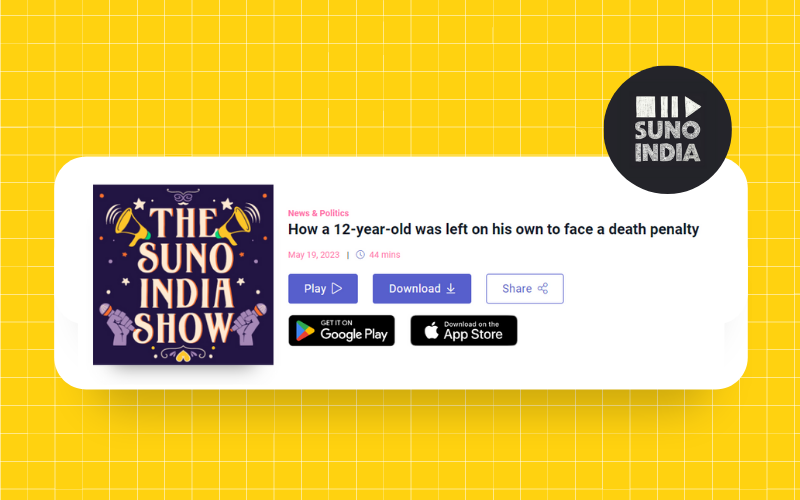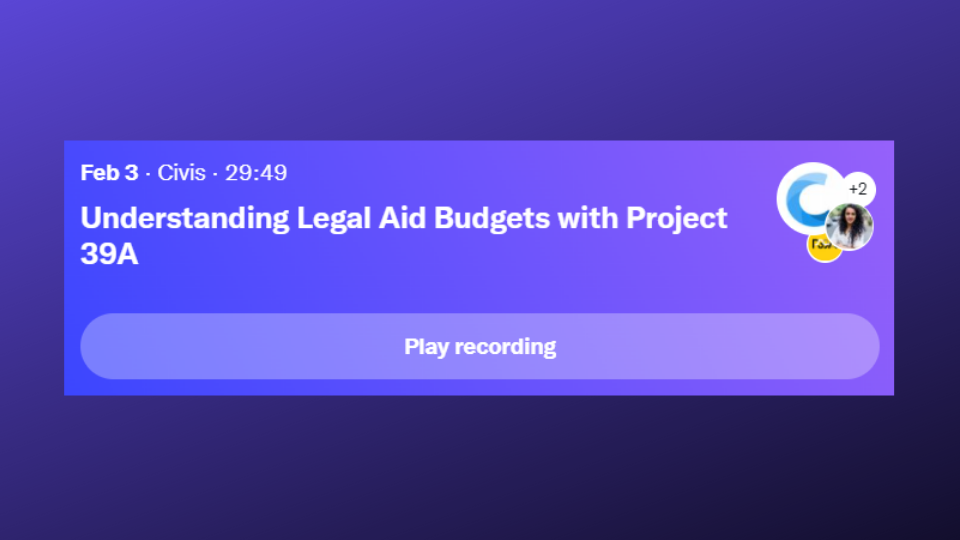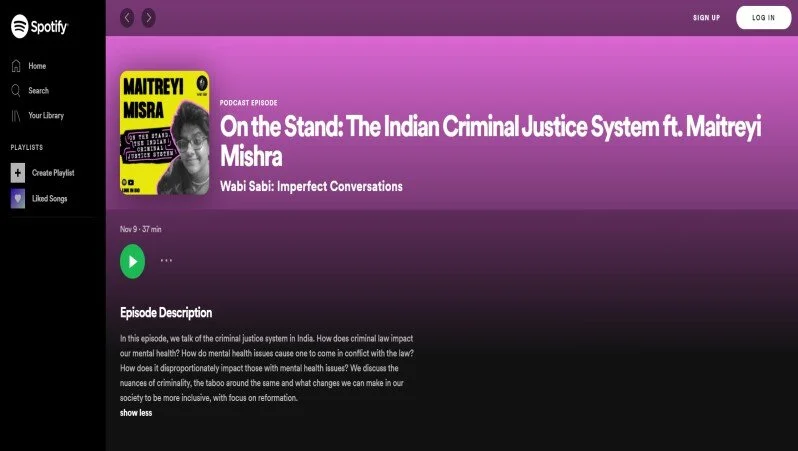Videos
How a 12-year-old was left on his own to face a death penalty | Suno India
The man who got free after 25 years on the death row | 3 Things Podcast
Death penalty creates only a façade of security | All Indians Matter
Why 2022 Was Significant For Capital Punishment In India | Article 14
Attack On Privacy Or A Bid To Improve Conviction Rates? | Criminal Procedure Bill | Amit Shah
Why Has The Criminal Procedure Bill Raised Questions? | India Development Debate
Understanding Legal Aid Budget with Project 39A
RightsUp Pop: Maitreyi Misra on Deathworthy
'Deathworthy' a mental health perspective on the death penalty in India
A discussion on the theme for the World Day against the Death Penalty 2021, 'Women on Death Row' and the future of death penalty in South Asia.
I’ve been of the opinion that death penalty is justified for those convicted of heinous crimes. But in doing so, am I completely isolating the perpetrator and their actions to this one crime? Does the onus of the death penalty fall majorly on those marginalised in our society?
Maitreyi Misra, our guest for this episode of THE SOS SHOW, heads the work on Mental Health and Criminal Justice at Project 39A, a criminal justice research and litigation centre at the National Law University Delhi.
Project 39A’s report Deathworthy explores the impact of the death penalty on the mental health of those receiving it and why many death row convicts have a fragile mental state to begin with. On this episode of The Suno India Show, our reporter Suryatapa Mukherjee speaks to Maitreyi Misra, lead author of the report and founding member of Project 39A at the National Law University.
A woman is sexually assaulted. She reports the assault. What happens next? Is she listened to? Does she get justice? And what does she have to listen from everyone else?
The justice system exists as part of society, not outside it. So, you’re particularly vulnerable if you happen to be poor, part of a minority or a vulnerable group such as Dalits, or of the wrong gender. Can we even have a workable society without justice equality? And why should all Indians know about Article 39A of the Constitution? Dr Anup Surendranath, Assistant Professor of Law and Executive Director of Project 39A at the National Law University, Delhi, speaks to All Indians Matter.
Listen to Suno India’s podcast on how DNA is used in investigations & how the science of DNA is addressed by the new DNA Technology Regulation Bill. Suryatapa Mukherjee talks to Shreya Rastogi who heads Project 39A’s work on forensics & Internet Freedom Foundation’s Rohin Garg.
Nisha Susan speaks to Anup Surendranath, director of Project 39A, and Jahnavi Misra, author of 'The Punished', on why they decided to transform the research centre's report into a book of vignettes, focusing on the lives of death row prisoners.
‘The Punished: Stories of Death Row Prisoners in India' is written by Jahnavi Misra, and based on works of Project 39-A. In this interview, we discuss the Book and the landscape of criminal law in India, especially for death row prisoners. The interview is hosted by Umang Poddar, an Editor at Lawctopus, and the guests are Jahnavi Misra, the author of the Book, and Anup Surendranath, Research Director at Project 39-A and Assistant Professor at NLU, Delhi.
LiveLaw brings you the latest legal news and updates from India and beyond. We are into fact based legal journalism. Endeavour of LiveLaw is to play an active role for a transparent and democratic legal ecosystem, in the larger public interest.
Death penalty needs to be reevaluated, specifically in the Indian context: Author Jahnavi Misra
‘The Punished: Stories of Death Row Prisoners in India' is a book by Jahnavi Misra, based on work by Project 39 A, in which Executive Director Anup Surendranath and his team interviewed nearly 400 prisoners on death row and their families between 2013 and 2016. The book puts together these interviews to narrate the stories of those who are looked upon as demons or monsters, trying to represent them as human beings. Watch Jahnavi Misra and Anup Surendranath in a conversation with ThePrint’s Ananya Bhardwaj
On the Stand: The Indian Criminal Justice System ft. Maitreyi Mishra
Criminal law & mental health interact in multiple ways, which are often overlooked. Our colleague Maitreyi Misra who heads P39A's work on Mental Health & Criminal Justice discusses some of these pathways in this podcast episode hosted by Unbottle Emotions.
Death Penalty in India | Faizan Mustafa | Anup Surendranath | Shreya Rastogi
Today on the #WorldDayAgainstTheDeathPenalty, Prof. Faizan Mustafa released an abridged version of the Death Penalty India Report in Hindi. Our Exececutive Director Anup Surendranath and Founding Member Shreya Rastogi in conversation with Prof Mustafa on the main findings in report.
Revisiting Jurisprudence on Capital Punishment in India | Criminal Law Cell
Project 39A co-founder Shreya Rastogi speaking on the Capital Punishment in India along with speakers Dr. Colin Gonsalves, Mr. Amit Desai and Mr. Aniket Nikam, in an event organized by the ILS Criminal Law Cell. The event was hosted on 11th July 2020 on YouTube.
Can the Nirbhaya Convicts Really be Executed on 16 December? | The Quint
Shreya Rastogi, a capital defence lawyer from Project 39A, explains how the Nirbhaya case convicts still have several legal options to challenge their death sentence, including review petitions, curative petitions and mercy petitions – and that even after these are exhausted, they can only be executed at least 2 weeks after a ‘black warrant’ is issued.
Death Penalty and Child Rape (Media Bol, The Wire : Episode 43)
Neetika Vishwanath talks to Urmiliesh Singh about the Criminal Law Ordinance 2018 23 April, 2018
A Theatre of Death: Challenging the Death Penalty in India
A Theatre of Death: Challenging the Death Penalty in India Anup Surendranath, discussing the status of the Death Penalty in India, with Kira Allman of the Oxford Human Rights Hub. 23 April, 2018
Will the Death Penalty really change India's Rape Culture?
Maitreyi Misra in conversation with Shalini Nair about the Criminal Law Amendment Ordinance, 2018. 23 April, 2018.
Why Death Penalty For Rapists Isn't The Solution
The Union cabinet has cleared an ordinance to amend several provisions of the Indian Penal Code, POCSO (Protection of Children from Sexual Offences) Act, Code of Criminal Procedure (Cr.PC) and Indian Evidence Act. This includes an amendment for death penalty for rape of children below 12 years. 23 April, 2018
Matters of Judgement: Report Release and Panel Discussion
Ms. Rebecca John (Senior Advocate, High Court of Delhi), Dr. Anuj Bhuwania (Associate Professor, Ambedkar University), Dr. Anup Surendranath (Director, Project 39A) and Ms. Neetika Vishwanath (Researcher, Project 39A) discuss the Report. 12 Dec, 2017
Reaffirming Justice
India is a country that actively doles out capital punishments. Unfortunately, it is not very surprising to see that a majority of the demographic of the accused happens to be those that can't afford to hire adequate legal representation. Here, find out how Ms. Lubhyathi Rangarajan got inspired to reaffirm justice through her her diligent actions. 13 June 2016
Discourse - Death penalty in India
A discourse by Justice Madan B. Lokur, Judge, Supreme Court of India; Nitya Ramakrishnan, Advocate, Supreme Court of India. 1 June, 2016
Explained: The Death Penalty Project
The National Law University's Death Penalty Research Project has prepared a socio-economic profile of prisoners sentenced to death in India, using statistics and case studies, to help create a resource for an in-depth understanding of the administration of the death penalty in India. 6 May, 2016
Law Commission Says No to Death: Inches Towards Life
Newsclick interviewed Anup Surendranath, Director, Centre on Death Penalty, NLU on the Law Commission report which has recommended that the country should move towards abolishing death penalty. 25 September, 2015
Capital Punishment and the Idea of Justice
Anup Surendranath, Capital Punishment and the Idea of Justice, 30 August, 2015.
The death penalty project
Every time India debates the death penalty, the rhetoric is shrill and volatile but lacking facts - on how the death penalty works in the country, on prisoners and their trials, their backgrounds. Now, for the first time a report comprehensively examines the lives of those on death row in India. NDTV on the Death Penalty Project. 21 Aug, 2015
The Big Picture - Does death penalty work as a deterrent?
Vinay Sahasarabuddhe, Prashant Bhushan, Anup Surendranath, Ashok Tandon, and Anil.K.Agarwal discuss whether death penalty work as a deterrent.
30 July 2015
National Convention Against Capital Punishment
Anup Surendranath, speaking at the National Convention Against Capital Punishment, PUDR. 1 February, 2014





















